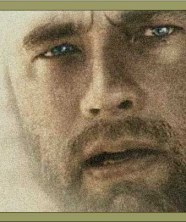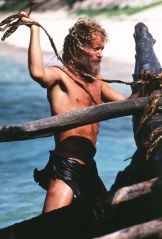| Cast Away |
| |
 |
USA, 2000. Rated PG-13. 143 minutes.
Cast: Tom Hanks, Helen Hunt, Nick
Searcy, Christopher Noth, Lari White, Geoffrey Blake, Jenifer Lewis, David
Allen Brooks, Semion Suradikov
Writer: William Broyles Jr.
Music: Alan Silvestri
Cinematographer: Don Burgess
Producers: Tom Hanks, Jack Rapke, Steve Starkey, Robert Zemeckis
Director: Robert Zemeckis
LINKS
|
 he
good news is that Cast Away is an interesting and courageous experiment.
Great filmmaking requires that risks be taken. The bad news is that even if
the gamble works, risk-taking in itself does not guarantee a great film. Cast
Away can't decide what kind of film it wants to be: a love story or a survival
tale. By trying to be both, it succeeds at being neither–not fully, anyway.
Though ultimately somewhat dissatisfying, there is nevertheless much to appreciate
in Cast Away.
he
good news is that Cast Away is an interesting and courageous experiment.
Great filmmaking requires that risks be taken. The bad news is that even if
the gamble works, risk-taking in itself does not guarantee a great film. Cast
Away can't decide what kind of film it wants to be: a love story or a survival
tale. By trying to be both, it succeeds at being neither–not fully, anyway.
Though ultimately somewhat dissatisfying, there is nevertheless much to appreciate
in Cast Away.
For the benefit of readers who have just returned from an extended holiday
on a desert island, Tom Hanks plays Chuck Noland, a Federal Express manager
who spends more time traveling than he does at home with his girlfriend, Kelly
Frears (Helen Hunt). On one ill-fated trip, his flight (a Federal Express cargo
plane) is blown off course and goes down in the South Pacific. Chuck is finally
washed ashore on a tiny atoll far from shipping routes or inhabited land.
Cast Away is a film in four acts, an exposition establishing Chuck's
life before the plane crash, Chuck's arrival on the island and initial struggle
to survive, Chuck on the island four years later, and an epilogue. As has been
widely reported, production was halted for a year after the first two acts were
shot so that Hanks could pull a Raging Bull in reverse, dropping some
50 pounds to reflect the weight his character loses after four years of eating
coconuts and fish.
The first act lacks drama, particularly because you know what's coming. Director
Robert Zemeckis and screenwriter William Broyles, Jr. go by rote through movie
conventions like the marriage proposal just before the ill-fated voyage. Yeah,
OK, this is all going to be very tragic–just get on with it, already! Chuck
even calls out "I'll be right back" as he gets on the plane, as a character
about to die might do in a low-rent horror flick. The one notable element of
the first act is the establishment of a time motif. Every move Chuck makes is
governed by the clock.
When it finally comes, the airplane crash sequence is spectacular, and the
drama begins. Chuck's initial struggle to survive on the deserted island, much
of it occurring in complete silence, is fantastic. One outstanding sequence
shows Chuck's efforts to start a fire, which proves to be extremely difficult
and even injurious. Apparently, rubbing two sticks together for a few minutes
is not all one needs to do.
The decision to halt shooting for a year has received the most publicity, but
the most inspired production decision was to eliminate music from the soundtrack
during Chuck's entire stay on the island. The indigenous sounds are far more
effective in conveying stillness and solitude than any music, no matter how
good, could have been. The focus is completely on Hanks, who carries the film
on his shoulders with his outstanding acting–another Academy Award™ nomination
awaits. The lack of music also meshes well with the time motif. The clock that
ran Chuck's life just… stops. The audience and Chuck feel that together.
There are some minor problems, including the lack of sufficient drama surrounding
Chuck's search for water. He's on the island for a full day (not to mention
the time he spent passed out in his lifeboat) before he even attempts to get
milk out of a coconut. Then Broyles throws Chuck a lifeline by having several
Federal Express packages wash up on the island's beach. The blades on a pair
of ice skates prove very useful–how convenient that someone is sending ice skates
to Malaysia. The second act is so absorbing, however, that these problems are
nothing to get agitated about.
AboutFilm.Com
The Big Picture
|
| Alison |
B
|
| Carlo |
B-
|
| Dana |
A-
|
| Glenn |
A-
|
| Jeff |
B+
|
| Kris |
B+
|
| ratings explained |
Also washing ashore in a Federal Express package is a volleyball on which Chuck
paints a face and names "Wilson," after its brand name. His relationship with
Wilson is either an attempt to comment on the human need for companionship and
the bizarre behavior induced by prolonged periods of solitude OR a convenient
script device allowing Hanks to speak more lines. Actually, it's a little of
both. As a script device, Wilson is unnecessary because Chuck could have just
talked to himself. Almost everybody does. Thematically, Wilson works fitfully
well. While the unexpected intensity of Chuck's attachment to Wilson is not
implausible (not at all), Broyles might have done a better job of making the
audience believe it.
Broyles doesn't show the relationship develop. Cast Away suddenly skips
ahead four years, when we find a very different Chuck, sun-bleached, slimmed-down,
tough, hirsute, and, as one might expect, a bit wacky. While it's an unexpected
and shocking before-and-after contrast, it avoids showing Chuck's changes over
time, the beginnings of which are not yet fully established before the end of
the second act. It also removes one of the most interesting episodes on the
island from our sight, leaving it to be related verbally in the last act. Too
much is left to be told to us in the last act, in what might be considered tidy
Hollywood fashion. Despite that, Zemeckis refrains from such total patness,
instead leaving a bit to the viewers' imagination.
The lack of a clear Hollywood ending is not why Cast Away fails to fully
satisfy (in fact, I liked the ending… I found the contrast of the vistas
in the final scene to the vistas on the desert island particularly effective).
Rather, it is Cast Away's failure to comment memorably on the human will
to survive or on the disparity between our modern civilization and our animal
past. Cast Away tries a bit, but ultimately sets its sights lower, focusing
on the dull romance that provides the film's bookends. Kelly is underwritten
(shorthand for "girlfriend"); we don't know why she and Chuck are together
in the first place, and the passion between them feels lackluster (not
that a big melodrama like the one between Mark Walberg and Diane Lane in The
Perfect Storm would have been preferred). The compelling questions are whether
and how Chuck will survive, whether he will leave his island or wait to be found,
whether there is greater risk in sailing the ocean in a makeshift raft or staying
on the illusory safety of the island, where the first infection or serious mishap
will likely kill him. The issue of whether Chuck and Kelly will ever see each
other again, and if they do, whether they will reunite is simply not of as much
interest and is undeserving of such a large chunk of the running time. Perhaps
that's unromantic, but the way it's presented in Cast Away, the love
story just seems like small potatoes.
Review
© January 2001 by AboutFilm.Com and the author.
Images © 2000 20th Century Fox and Dreamwork L.L.C. All Rights Reserved.


